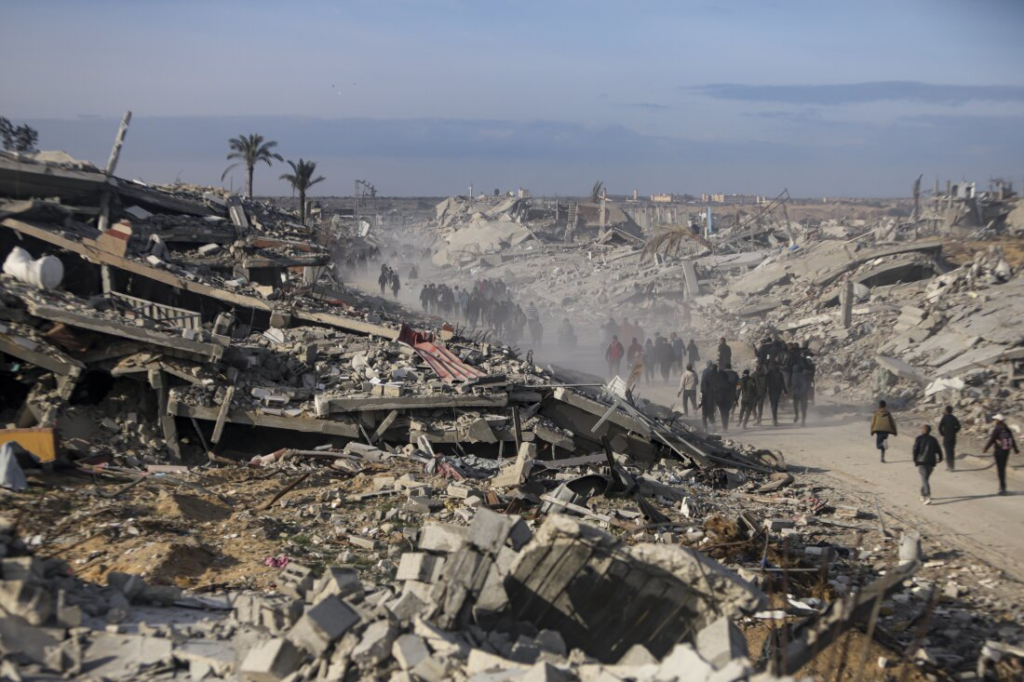Former U.S. President Donald Trump has made headlines once again with his controversial proposal to take over and rebuild Gaza, asserting that Palestinians displaced from the war-torn territory will not have the right to return.
The plan has sparked outrage among Palestinian leaders, international organizations, and human rights advocates, while earning praise from Israeli Prime Minister Benjamin Netanyahu. Trump’s vision of “owning Gaza” has raised serious questions about sovereignty, international law, and the long-standing Israeli-Palestinian conflict.
Trump’s Vision for Gaza: A Real Estate Project?
In a recent interview with Fox News, Trump described his plan for Gaza as a long-term real estate development project rather than a political solution to the ongoing conflict. “No, they wouldn’t [have a right to return], because they’re going to have much better housing,” Trump stated. “I’m talking about building a permanent place for them.”
He further elaborated that Palestinians would be resettled in neighboring countries such as Jordan and Egypt, where he claimed their quality of life would improve significantly.
Trump’s remarks were met with immediate backlash from Palestinian leaders. The Palestinian Authority dismissed the idea as a violation of fundamental rights, stating that “our land is not for sale.” Hamas also strongly opposed the plan, calling it “absurd” and reflective of “deep ignorance of Palestine and the region.”
Read : Karim Khan Named As First ‘Target’ of Trump’s Sanctions on ICC
They argue that Gaza is an integral part of Palestinian land, and any forced displacement would be considered a continuation of historical injustices dating back to the 1948 Nakba.
International Reactions and Legal Concerns
The international community has reacted strongly against Trump’s proposal. The United Nations has warned that forced displacement of civilians from occupied territory is prohibited under international law and could amount to ethnic cleansing. German Chancellor Olaf Scholz condemned the plan as a “scandal,” while other European leaders expressed similar concerns.
Additionally, Jordan and Egypt have outright rejected Trump’s claims that they would accept displaced Palestinians. Both countries have long resisted pressure to absorb large numbers of Palestinian refugees, fearing the political and economic consequences.
Jordan’s King Abdullah and Egypt’s President Abdel Fattah al-Sisi are set to meet with Trump to discuss the situation, but analysts doubt they will change their stance.
Despite global condemnation, Israeli Prime Minister Benjamin Netanyahu has praised Trump’s proposal, calling it “revolutionary and creative.”

He welcomed the idea of permanently resettling Palestinians outside Gaza, arguing that it aligns with Israel’s long-term security interests. “President Trump came with a completely different vision, much better for the State of Israel, a revolutionary and creative vision, which we are discussing,” Netanyahu stated during a cabinet meeting in Jerusalem.
Israel’s government has historically opposed the return of Palestinian refugees, fearing that their presence would shift demographic balances in favor of Palestinians. Netanyahu’s endorsement of Trump’s plan signals an alignment of interests, further complicating prospects for a diplomatic resolution to the Israeli-Palestinian conflict.
Historical Parallels: A Second Nakba?
Many Palestinians fear that Trump’s plan mirrors the events of the 1948 Nakba, during which hundreds of thousands of Palestinians were displaced or expelled from their homes in the wake of Israel’s establishment.
Today, a significant portion of Gaza’s population consists of descendants of those refugees, and the right of return has remained a key demand in peace negotiations.
Trump’s assertion that displaced Palestinians would have “much better lives” elsewhere ignores the deep-rooted historical and emotional connection that Palestinians have to their homeland. For them, leaving Gaza is not just a logistical issue but a matter of identity, heritage, and self-determination.
The backdrop to Trump’s proposal is a dire humanitarian crisis in Gaza. Since Israel launched its military campaign against Hamas following the October 7, 2023, attacks, over 48,200 people have been killed, and much of the enclave’s infrastructure has been destroyed. More than 70% of buildings have been damaged, and basic services such as healthcare, water, and sanitation have collapsed.

The situation has left many Gazans with no choice but to seek refuge elsewhere. However, rather than facilitating permanent displacement, humanitarian organizations emphasize the need for reconstruction and the return of displaced people to their homes.
Political and Strategic Motivations Behind Trump’s Plan
Trump’s Gaza plan is not just about rebuilding the territory; it also carries significant political and strategic implications. By advocating for the displacement of Palestinians, Trump is aligning himself with hardline Israeli policies and catering to pro-Israel factions within the U.S. political landscape.
Furthermore, his proposal to “own” Gaza raises questions about American involvement in Middle Eastern geopolitics. Who would Trump be buying Gaza from, and under what legal framework? These unanswered questions highlight the unrealistic nature of his plan and its potential to exacerbate tensions rather than resolve them.
Trump’s proposal to take over Gaza and permanently displace Palestinians has ignited a firestorm of controversy. While Israeli leadership has welcomed the idea, the Palestinian Authority, Hamas, and international organizations have strongly rejected it as a violation of human rights and international law.
The future of Gaza remains uncertain, but one thing is clear: any long-term solution to the Israeli-Palestinian conflict must involve the voices and rights of those directly affected. Forced displacement and real estate-style redevelopment are unlikely to bring the stability and peace that the region desperately needs.

